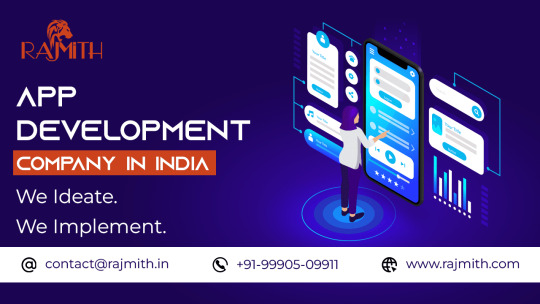#Best app developers
Text
Are you looking to conquer the Blackjack table? Control your bankroll, stay in check under pressure, and master the basic strategy.
youtube
2 notes
·
View notes
Text
The Future of App Development: What to Expect in 2024 and Beyond
In today's rapidly evolving digital landscape, app development has become a critical component of every business strategy. With millions of apps on both Android and iOS platforms, it’s clear that mobile applications are integral to connecting with customers, enhancing user experiences, and driving innovation.
But where is app development heading in 2024 and beyond? Here are a few trends that are set to shape the future.

1. AI-Powered Applications
Artificial Intelligence (AI) has already transformed the way we use apps, from personalized recommendations to voice assistants. In the future, AI integration will only deepen. Expect apps that can anticipate user needs, automate tasks, and offer real-time insights through machine learning models. This shift is particularly important for industries like healthcare, finance, and e-commerce, where data-driven decisions and predictive analytics are vital.
2. Cross-Platform Development
Gone are the days when developers needed to create separate versions of their apps for different platforms. Tools like Flutter, React Native, and Xamarin allow developers to write code once and deploy it across multiple platforms seamlessly. This trend in app development not only speeds up time-to-market but also ensures a consistent user experience across devices.
3. Augmented and Virtual Reality (AR/VR)
While AR and VR were once considered futuristic, they are now becoming mainstream. With advancements in hardware and software, developers are integrating immersive experiences into apps, particularly in gaming, retail, and education sectors. Imagine trying on clothes virtually or taking virtual tours of places all through your phone – the possibilities are endless.
4. 5G Connectivity
As 5G networks roll out globally, app developers have new opportunities to explore. The ultra-fast speeds and low latency of 5G will enable more complex applications, such as those that require real-time interaction or cloud-based gaming. This new level of connectivity will push the boundaries of what apps can achieve, enhancing user experiences and driving more interactive content.
5. Enhanced Security and Privacy
As mobile apps become more deeply integrated into users' lives, security and privacy concerns are paramount. With increased regulations like GDPR and the growing awareness of data privacy issues, app developers are focusing more on encryption, secure coding practices, and transparent data usage policies.
Conclusion
App development is constantly evolving, with new technologies and user expectations driving innovation. Whether you're a business looking to create an app or a developer staying on top of trends, it’s crucial to keep an eye on the changing landscape to remain competitive. The future holds immense possibilities as AI, AR/VR, and 5G come into play, enhancing both the creation process and the end-user experience.
As the demand for innovative, secure, and highly functional apps grows, app development will continue to be at the forefront of technological evolution.
We offers expert app development services, delivering innovative and high-performance mobile applications. We create seamless, user-friendly apps tailored to your business needs, ensuring top-notch functionality and user experience. Contact us
0 notes
Text
Why Startups Should Invest in best App Developers Early On
''Discover why startups should hire top app developers from leading app software development companies. Boost your success with the best app development firm Brain Inventory.
#hire dedicated developers#app software development company#best app developers for startups#best app developers#mobile software development company#app development firms
0 notes
Text
The iPhone, a ubiquitous device in the palm of billions, has transformed the way businesses operate and interact with customers. With each passing year, the app ecosystem evolves, presenting unprecedented opportunities for innovation. In 2024, businesses across the B2B, B2C, and C2C spectrums have a golden chance to capitalize on emerging trends and untapped markets. This blog delves into the top iPhone app ideas that can potentially revolutionize your business.
Read more here https://a4everyone.org/iphone-app-ideas-fueling-business-growth-in-2024/
#Adaptive learning app development#app design#app development#app development company#best app developers#iphone app#iphone app development#iPhone app development services
1 note
·
View note
Text
How many types of app developments?
Introduction:
Sky web app development company explain Mobile app development is the process of creating software applications that run on mobile devices, such as smartphones and tablets. These applications can be pre-installed on devices during manufacturing or delivered as web applications using server-side or client-side processing to provide an "app-like" experience within a web browser.
Types of app developments:
Understanding the various types of app development is crucial, especially when considering their real-world applications. Here are examples for each type:
1. Native App Development
2. Web App Development
3. Hybrid App Development
4. Progressive Web App (PWA) Development
5. Cross-Platform App Development
6. Enterprise App Development
7. Gaming App Development
8. IoT App Development
1. Native App Development
Native app development involves creating mobile applications specifically for a particular operating system, such as iOS or Android, using the respective platform’s native programming languages and development tools. This method ensures that the app fully leverages the features and capabilities of the target device, providing the best possible performance and user experience.
Examples:
iOS: Instagram, built using Swift.
Android: Spotify, developed using Kotlin.
Advantages:
Optimal Performance: Native apps are compiled into machine code, which allows them to run faster and more efficiently than web or hybrid apps.
Full Access to Device Features: Native development provides full access to the device’s hardware, enabling the implementation of advanced features and functionalities.
Better User Experience: By adhering to the platform’s design principles and guidelines, native apps offer a more consistent and enjoyable user experience.
Enhanced Security: Native apps can leverage platform-specific security features, providing better protection against vulnerabilities and threats.
Disadvantages:
Some Disadvantages of native app development:
Higher Development Costs: Developing native apps for multiple platforms requires separate codebases, which can increase development time and costs.
Longer Development Time: Since native apps need to be developed separately for each platform, the overall development process can be longer compared to cross-platform or web apps.
Maintenance Complexity: Maintaining and updating multiple codebases for different platforms can be challenging and resource-intensive
2. Web App Development:
Sky Web Mobile app development involves creating applications that run in a web browser. These applications are built using standard web technologies such as HTML, CSS, and JavaScript. Unlike native apps, web apps are platform-independent and can be accessed from any device with an internet connection.
Examples of Web Apps:
Google Docs: An online word processor that allows users to create, edit, and share documents in real-time.
Trello: A web-based project management tool that uses boards, lists, and cards to help teams organize and prioritize tasks.
Slack: A collaboration hub that integrates messaging, file sharing, and third-party apps to enhance team communication.
Advantages: Some Advantages of web app development
Cross-Platform Compatibility: Web apps can be accessed from any device with a web browser, eliminating the need for separate versions for different platforms.
Ease of Maintenance: Updates and maintenance are easier since changes are made on the server side and instantly available to users without the need for downloads or installations.
Cost-Effective Development: Developing a single web app that works across all platforms can be more cost-effective than developing multiple native apps.
Quick Deployment: Web apps do not require app store approval, allowing for faster deployment and updates.
Disadvantages: Major Disadvantages of web app development
Limited Access to Device Features: Web apps have restricted access to device hardware and native APIs compared to native apps.
Performance: Web apps may not perform as well as native apps, particularly for graphics-intensive applications.
Internet Dependency: Most web apps require an active internet connection to function, although some offline capabilities can be implemented.
User Experience: The user experience may not be as seamless as native apps, especially on mobile devices.
3. Hybrid App Development:
Sky web app develop offers Hybrid app development involves creating mobile applications that combine elements of both native and web apps. These apps are built using web technologies such as HTML, CSS, and JavaScript and are then wrapped in a native container that allows them to be distributed through app stores and access native device features.
Examples of Hybrid Apps
Instagram: Initially used hybrid development to expand its reach quickly.
Uber: Utilizes a hybrid approach for its driver app to ensure compatibility across different devices.
Twitter: The mobile app is developed using hybrid technologies to offer a consistent experience across platforms.
Advantages
Cost-Effective: Developing a single codebase for multiple platforms is more cost-effective than developing separate native apps.
Faster Development: A single codebase means quicker development and easier maintenance.
Cross-Platform Compatibility: Hybrid apps can run on both iOS and Android, reaching a wider audience with minimal effort.
Easy Updates: Updates are easier to manage since changes need to be made only once and are reflected across all platforms.
Disadvantages
Performance Limitations: Hybrid apps may not perform as well as native apps, especially for graphics-intensive or resource-heavy applications.
Limited Access to Native Features: While hybrid apps can access many device features, they may not have full access to all native APIs and functionalities.
User Experience: The user experience may not be as smooth or consistent as native apps due to the reliance on web technologies.
Potential for Bugs: There can be more potential for bugs and performance issues due to the complexity of ensuring compatibility across multiple platforms.
4.Progressive Web App (PWA) Development:
Progressive Web Apps (PWAs) are web applications that utilize modern web capabilities to deliver an app-like experience to users. PWAs are designed to be fast, reliable, and engaging, providing features that were traditionally exclusive to native apps. They combine the best of web and mobile apps to enhance user experience and reach.Sky web mobile app development company offers all types of web app development.
Examples of PWAs
Twitter Lite: A PWA version of Twitter that provides a fast, reliable, and engaging user experience even on slow networks.
Starbucks: The Starbucks PWA allows customers to browse the menu, customize orders, and add items to their cart offline.
Flipkart Lite: A lightweight, fast-loading PWA version of the Flipkart e-commerce platform.
Pinterest: Their PWA offers improved performance and engagement, especially in markets with limited connectivity.
Advantages of PWAs
Cross-Platform Compatibility: PWAs work across all devices and browsers, ensuring a consistent user experience.
Offline Functionality: Service workers enable offline access and faster load times, improving usability in areas with poor connectivity.
App-Like Experience: PWAs provide a native app-like experience with features like push notifications, home screen installation, and full-screen mode.
Cost-Effective: Developing a PWA is typically more cost-effective than developing separate native apps for multiple platforms.
No App Store Approval: PWAs do not require app store submission, allowing for faster deployment and updates.
Improved SEO: PWAs are discoverable by search engines, potentially increasing visibility and traffic.
Engagement: Features like push notifications and home screen installation can enhance user engagement and retention.
Disadvantages of PWAs
Limited Access to Device Features: PWAs have limited access to certain native device features compared to native apps, such as advanced camera controls, Bluetooth, and other hardware-specific capabilities.
Performance: While PWAs perform well in most cases, they may not match the performance of native apps, especially for graphics-intensive or resource-heavy applications.
Browser Compatibility: Some features of PWAs may not be fully supported in all browsers, which can affect functionality for some users.
Limited App Store Presence: PWAs are not listed in traditional app stores, which can reduce discoverability compared to native apps.
User Experience: While PWAs provide an app-like experience, some users may still prefer the feel and responsiveness of native apps.
5.Cross-Platform App Development
Cross-platform app development involves creating applications that can run on multiple operating systems, such as iOS, Android, and Windows, using a single codebase. This approach allows developers to write code once and deploy it across various platforms, which can save time and resources compared to developing separate native apps for each platform.
Examples of Cross-Platform Apps
Facebook: Uses React Native to deliver a consistent experience across both iOS and Android.
Google Ads: Built with Flutter, ensuring performance and appearance are consistent across different platforms.
Skype: Developed using Xamarin, allowing for a unified codebase for iOS, Android, and Windows.
Airbnb: Previously used React Native to enhance their mobile app development process.
Advantages of Cross-Platform Apps
Cost-Effective: Developing a single codebase for multiple platforms reduces development and maintenance costs.
Faster Development: Shared codebase means quicker development and easier updates across platforms.
Consistent UI/UX: Ensures a uniform user experience across different devices and platforms.
Wider Reach: Deploying on multiple platforms simultaneously increases the potential user base.
Easier Maintenance: Updates and bug fixes are made in a single codebase, simplifying the maintenance process.
Reusable Code: Significant portions of code can be reused, reducing redundancy and improving efficiency.
Disadvantages of Cross-Platform Apps
Performance Issues: Cross-platform apps may not match the performance of native apps, particularly for graphics-intensive or resource-heavy applications.
Limited Access to Native Features: Some native device features and APIs may be harder to access or implement, potentially limiting functionality.
Inconsistent UI/UX: While frameworks strive for consistency, subtle differences in platform behaviors can affect the user experience.
Larger App Size: Cross-platform frameworks can introduce additional overhead, leading to larger app sizes compared to native apps.
Dependency on Frameworks: Relying on third-party frameworks means being dependent on their updates and community support.
Platform-Specific Bugs: Bugs or performance issues might arise that are specific to one platform and can be harder to troubleshoot and resolve.
6.Enterprise app development:
Enterprise app development refers to the creation of software applications tailored to meet the specific needs and requirements of large organizations and businesses. These applications are designed to improve productivity, streamline business processes, and support complex workflows within the enterprise environment. Unlike consumer apps, enterprise apps often require integration with existing systems and focus on enhancing internal operations.
Examples of Enterprise Apps
SAP ERP: An enterprise resource planning system that integrates various business functions like finance, supply chain, and human resources.
Salesforce: A customer relationship management (CRM) platform that helps businesses manage customer interactions, sales, and support.
Microsoft Dynamics 365: A suite of business applications for managing finance, operations, customer service, and more.
Slack: Used for internal communication and collaboration within organizations, offering integration with other enterprise tools.
Advantages of Enterprise App Development
1.Custom Fit: Tailored specifically to meet the unique needs and requirements of the
organization, improving efficiency and productivity.
2.Enhanced Integration: Can be integrated with existing enterprise systems and databases,
ensuring seamless data flow and process automation.
3.Scalability: Designed to handle a large number of users and high volumes of data,
accommodating business growth and changing needs.
4.Improved Security: High levels of security and compliance with industry regulations to
protect sensitive business data.
5.Increased Productivity: Streamlines workflows, automates tasks, and provides tools to
enhance employee productivity and collaboration.
Disadvantages of Enterprise App Development:
High Development Costs: Custom solutions can be expensive to develop, implement, and maintain, particularly for large-scale applications.
Complex Implementation: Integrating with existing systems and processes can be complex and time-consuming, requiring significant planning and coordination.
Longer Development Time: Developing a tailored solution that meets all the specific needs of the organization can take considerable time.
User Adoption Challenges: Employees may face a learning curve and resistance to change, impacting the successful adoption of the new system.
Maintenance and Upgrades: Ongoing maintenance, support, and updates can be resource-intensive, requiring dedicated IT resources and budget.
7.Gaming app development:
Gaming app development involves creating software applications designed for entertainment, often incorporating interactive and engaging gameplay. These apps can be developed for various platforms, including mobile devices, consoles, and PCs. Gaming apps range from simple puzzle games to complex, multi-player online experiences.
Examples of Gaming Apps
Fortnite: A popular battle royale game developed by Epic Games, known for its engaging multiplayer experience and frequent updates.
Candy Crush Saga: A match-three puzzle game developed by King, featuring colorful graphics and addictive gameplay.
PUBG Mobile: A mobile version of the popular PlayerUnknown's Battlegrounds, offering a battle royale experience on smartphones.
Angry Birds: A physics-based puzzle game developed by Rovio Entertainment, featuring simple yet addictive gameplay.
Advantages of Gaming App Development
High Engagement: Well-designed games can provide highly engaging and immersive experiences, keeping users entertained for extended periods.
Revenue Potential: Successful games can generate significant revenue through in-app purchases, ads, and subscriptions.
Broad Audience: Games appeal to a wide range of users, from casual players to dedicated gamers, offering opportunities for large user bases.
Innovation and Creativity: Game development allows for creative expression and innovation in gameplay mechanics, graphics, and storytelling.
Community Building: Multiplayer and social features can help build communities and foster social interaction among players.
Disadvantages of Gaming App Development:
High Development Costs: Developing high-quality games with advanced graphics and features can be expensive and resource-intensive.
Intense Competition: The gaming market is highly competitive, with many games vying for users' attention, making it challenging to stand out.
Time-Consuming Development: Game development can be a lengthy process, often requiring months or years to design, develop, and refine.
Technical Challenges: Creating games with complex graphics, physics, and multiplayer functionality can pose significant technical challenges.
Monetization Risks: Monetization strategies, such as in-app purchases or ads, can affect user experience and may not always lead to expected revenue.
8. IoT App Development
Internet of Things (IoT) app development involves creating applications that interact with and manage a network of interconnected devices and sensors. These apps enable users to monitor, control, and automate various devices from a central platform, leveraging data collected from IoT devices to provide valuable insights and functionalities.
Examples of IoT Apps
Google Home: Manages smart home devices such as lights, thermostats, and speakers, allowing users to control them via voice commands or the app.
Fitbit: Monitors health metrics like steps, heart rate, and sleep patterns using wearable devices and provides insights through its app.
Nest Thermostat: Allows users to control their home heating and cooling systems remotely and provides energy-saving recommendations based on usage patterns.
SmartThings: Integrates with a wide range of smart home devices, enabling users to automate and control their home environment through a single app.
Advantages of IoT App Development
Enhanced Automation: IoT apps can automate tasks and processes, improving efficiency and convenience for users (e.g., automated lighting based on time of day).
Real-Time Monitoring: Provides users with real-time data and control over connected devices, enhancing their ability to manage and respond to changes quickly.
Improved Decision-Making: Analyzes data from IoT devices to offer valuable insights and recommendations, supporting informed decision-making (e.g., energy usage patterns).
Increased Efficiency: Helps streamline operations and reduce manual effort by automating routine tasks and optimizing device usage.
Remote Access: Enables users to monitor and control devices from anywhere, providing greater flexibility and convenience.
Disadvantages of IoT App Development
Security Concerns: IoT devices and apps can be vulnerable to cyberattacks, requiring robust security measures to protect sensitive data and privacy.
Complex Integration: Integrating various devices and sensors from different manufacturers can be complex and may require significant development effort.
Data Privacy: The collection and storage of personal data from IoT devices raise privacy concerns, necessitating careful handling and compliance with regulations.
Interoperability Issues: Ensuring compatibility and seamless communication between devices from different vendors can be challenging.
Dependence on Connectivity: IoT apps rely on stable internet connections for real-time monitoring and control, and connectivity issues can impact functionality.
Conclusion:
Understanding the different types of app development is essential for making informed decisions that align with specific needs and objectives. Whether aiming for optimal performance, broad accessibility, or specialized functionality, each approach offers unique benefits and challenges. By selecting the right type of app development, businesses and developers can create effective and engaging mobile applications that meet their goals and cater to their target audience.
For More Information to visit our website: SKYWEB DESIGN APP DEVELOPMENT
Contact number: +91 79817 28810
Address: 15floor, manjeera trinity corporation,kphb hyderabad,TELANGANA.
#types of app development#best app development#different types of apps#how to create a application#best app developers#best app developers in hyderabad#https://skywebdev.in/
0 notes
Text

As a leading app development company in India, we specialize in crafting tailor-made digital solutions to propel businesses forward. Our adept team of developers and designers harnesses state-of-the-art technologies to deliver high-quality mobile applications that meet diverse client requirements. From ideation to deployment, we prioritize innovation, efficiency, and client satisfaction, ensuring each project achieves remarkable success. Trust us to transform your ideas into impactful mobile experiences, solidifying our position as a trusted partner in India's app development landscape.
#appdevelopers #appdevelopers #iosappdevelopment #androidappdevelopmentcompany #bestiosappdevelopment #bestandroidappdevelopmentcompany #bestiosapp #MobileAppDevelopment, #AppDevelopmentCompany, #BestAppDevelopmentCompany
#app development#best app development company#best app developers#best app development software#app development agency
0 notes
Text
How to Pick the Top Mobile App Development Company

Aphonic Solutions is a leading mobile application development firm in India. We are an Android development company in Rajkot that can convert your app's ideas to actual and we're also a top web development company in Rajkot. For more information visit our blog.
#app development agencies#app development company#mobile app development company in Rajkot#professional app developers#best app developers#IOS app development company in Rajkot
0 notes
Text
#best mobile app development company#mobile app development company#app developers#app developers near me#app development company#mobile app developer#freelance app developers#best app developers#app building company#mobile app developers#find app developer#app creator company#best app developers for startups#app design company#app development agency#app making company
1 note
·
View note
Text
End-to-end mobile App Development Services for iOS, Android, and Cross-platform
We have been providing world-class mobile app development services for Startups, mid-scale businesses, and enterprises since 2011. Our highly skilled mobile app developers will work on transforming your app idea into an innovative and secure mobile application.
For more details - https://3sitservices.com/mobile-app-development-services/
#software development#application#software#mobile application development#3sitservices#development#mobile app development#best app developers
0 notes
Text
0 notes
Text
The UI/UX design services focus on visual appeal and user experiences. For app development firms, UI/UX services are a must for crafting interfaces and enhancing usability.
#ux design services#app software development company#best app developers for startups#best app developers#mobile software development company#app development firms
0 notes
Text
Top And Best App Developers 2023 Near Me
At Susnhiene, we believe in turning your app ideas into a concrete plan of action with our expert guidance every step of the way. As we are Near New York Based app developers, we have a sharp eye for the latest trends and innovations.
With mobile app usage on the rise, there's never been a better time to create your own app. Our competitive advantage lies in our market-leading IOS and Android development capabilities, backed by our team of passionate UI/UX designers and experienced software developers. Our apps are not only visually stunning but also highly functional.
And if your app suddenly experiences a surge in popularity, don't worry - our cloud-based technologies (such as Amazon Web Services - AWS and Microsoft Azure) provide a scalable, robust, and reliable system that can handle any traffic.
Blog : https://sites.google.com/view/top-and-best-app-developers/home
0 notes
Text
Best App Development Agency in India

Recognized as the best app development agency in India, we specialize in creating transformative mobile solutions that cater to diverse client needs. Our expert team of developers and designers leverages cutting-edge technologies to deliver innovative apps with exceptional user experiences. Committed to excellence, we ensure every project meets the highest standards of quality, creativity, and client satisfaction. With a track record of success, we stand as the epitome of app development excellence in India
#applicationdevelopment #appdev #mobileappsdevelopment #androidapp #mobileappdevelopmentservices #appdevelopmentindia #mobileapplication #appdevelopmenttips #bestecommerceappdeveloper #bestandroidappdevelopmentcompany #bestiosapps
#MobileAppDevelopment, #AppDevelopmentCompany, #BestAppDevelopmentCompany
0 notes
Text
App Development Services
Find Best and most Professional App Developers. Hire the experience #MindYouInfotech team who has experience in the industry working so any app like Blinkit for #GroceryApp #GroceryDeliveryapp #WeddingApp #livestreamingapp etc. Start developing your dream project with us. Hire the #MindYouInfotech team at an affordable cost.

0 notes
Text










EXE Art dump
#lord x#lordx#lord x fnf#faker sonic#sonic exe#sonic.exe#my art#digital art#apologies for not posting in a long while#I kinda forgot about this app#btw I opened an “ask me anything”#feel free to ask me whatever and I’ll try my best to answer#some doodles are of AUs me and friends are developing
332 notes
·
View notes